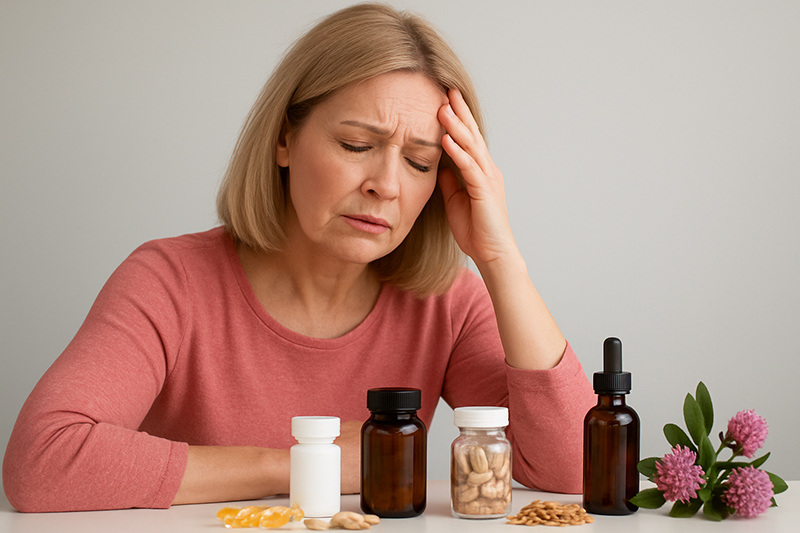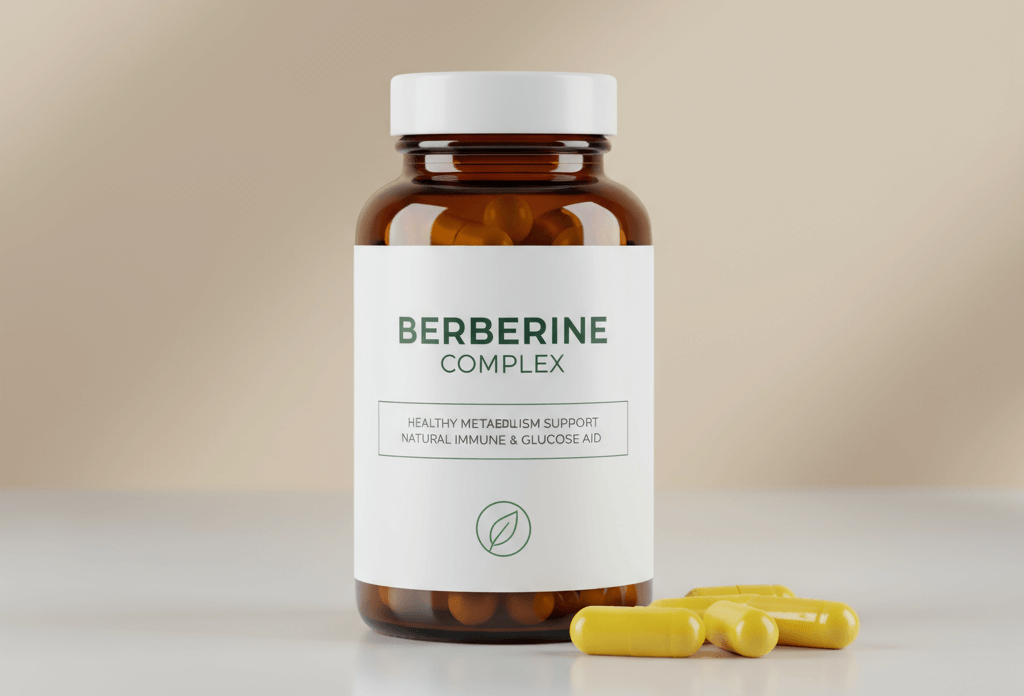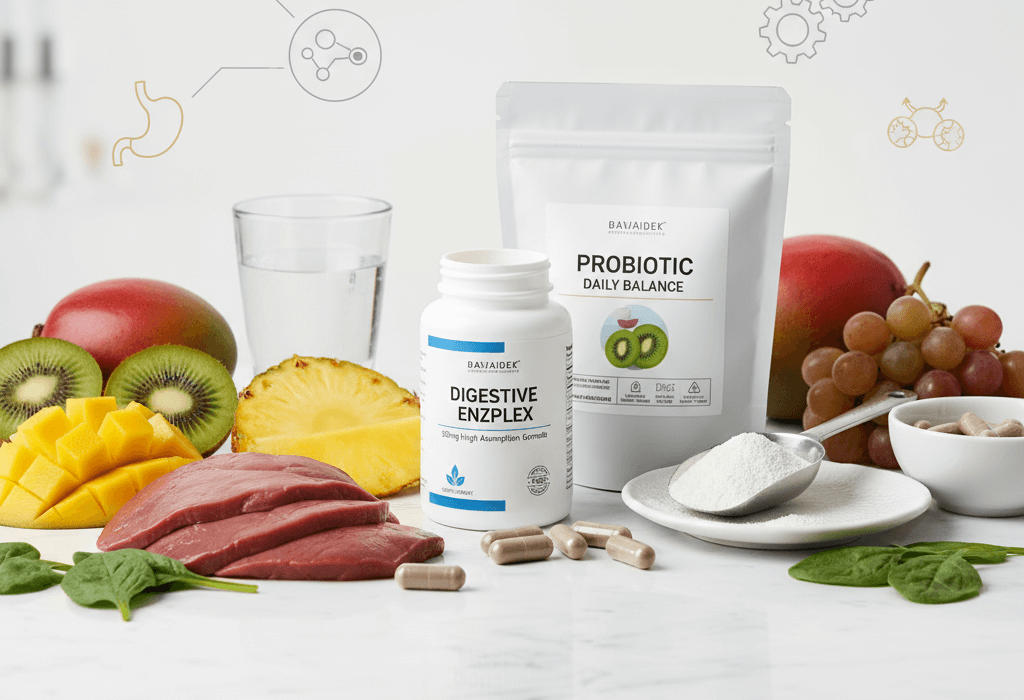Perimenopause is a natural and often significant transition in a woman's life, marking the years leading up to menopause. This period can bring about a range of challenging symptoms, including hot flashes, night sweats, mood swings, and changes in sleep patterns. As a result, many people turn to dietary supplements as a way to manage these changes.
While some supplements have a degree of scientific support, their effectiveness can vary greatly from person to person. It is crucial to approach this topic with a critical and informed perspective.

Important Disclaimer: The information provided here is for educational purposes only and is not a substitute for professional medical advice. Always consult with a qualified healthcare provider, such as your doctor or a registered dietitian, before starting any new supplement to ensure it is safe and appropriate for your specific health needs and to avoid potential drug interactions.
Understanding the Hormonal Shift
The symptoms of perimenopause are primarily driven by fluctuating levels of estrogen and progesterone. Estrogen, in particular, can surge and drop unpredictably, leading to the body's various reactions. Supplements aimed at managing these symptoms often work in one of two ways: they either contain plant-based compounds that mimic estrogen (phytoestrogens) or they support other bodily functions that are affected by the hormonal changes.
Common Perimenopause Supplements: What the Evidence Says
The research on perimenopause supplements is often mixed, with some studies showing positive results while others find little to no effect. Here is a look at some of the most commonly used supplements and the current scientific understanding of their benefits.
Black Cohosh
This herbal remedy is one of the most widely studied supplements for perimenopause. It is most often used to alleviate hot flashes and night sweats. Some studies suggest black cohosh may provide relief for hot flashes in some individuals, while other, larger studies have found no significant difference compared to a placebo. It is generally considered safe for short-term use, but should be avoided by individuals with liver disease or those with hormone-sensitive conditions without professional consultation.
Soy Isoflavones and Red Clover
Both of these supplements contain plant-derived compounds called phytoestrogens, which have a structure similar to human estrogen. The idea is that these compounds can weakly bind to estrogen receptors, helping to mitigate the effects of declining estrogen levels. Research on both is mixed; some studies show a moderate reduction in the frequency and severity of hot flashes, while others have found little benefit. Due to their estrogen-like properties, individuals with a history of estrogen-sensitive cancers should exercise caution.
Evening Primrose Oil
This supplement is rich in gamma-linolenic acid (GLA), an omega-6 fatty acid. It is frequently used for symptoms like breast tenderness and hot flashes. However, the scientific evidence supporting its use for these symptoms is limited and inconclusive. Most research has found no significant benefit over a placebo.
Ginseng
Various forms of ginseng, particularly American ginseng, are sometimes used during perimenopause to help with mood disturbances, fatigue, and cognitive function. Some small-scale studies have indicated ginseng may help improve mood and reduce fatigue, but there is little to no evidence to support its effectiveness for hot flashes.
Vitamin D and Calcium
While these do not directly address symptoms like hot flashes, they are critically important for perimenopausal health. Estrogen plays a key role in bone density, and as its levels drop, the risk of developing osteoporosis (a condition that weakens bones) significantly increases. The evidence for Vitamin D and calcium's role in bone health is strong and well-established. They are essential for maintaining bone mineral density and reducing the risk of fractures.
Magnesium and Omega-3 Fatty Acids
These nutrients can help support systems affected by hormonal shifts. Magnesium is known for its calming properties and is used to support sleep and reduce anxiety. Omega-3 fatty acids, found in supplements like fish oil, are important for brain health and may help improve mood and reduce depression symptoms often associated with perimenopause.
Additional Supplements to Consider
Beyond the common options, other supplements are used to address specific symptoms, though their research is often still emerging.
-
Dong Quai: This traditional Chinese herb is sometimes used to relieve hot flashes. However, the research evidence is very limited, and some studies have found no benefit over a placebo. Dong Quai may also interact with blood-thinning medications.
-
Vitex Agnus-Castus (Chasteberry): This supplement is commonly used to help regulate menstrual cycles, which can become erratic during perimenopause. It works by influencing pituitary hormones that affect the menstrual cycle.
-
Probiotics: The gut microbiome plays a key role in metabolism and may influence hormone circulation. While probiotics do not directly affect symptoms like hot flashes, they may support overall health and indirectly help manage issues like mood swings and digestive discomfort.
Beyond the Bottle: Foundational Lifestyle Support
Supplements can be a useful part of managing perimenopause, but they are not a silver bullet. The true foundation of managing this transition lies in a holistic approach to your health.
-
Balanced Diet: Increase your intake of fiber, healthy fats, and calcium-rich foods. Reducing your consumption of caffeine, alcohol, and spicy foods may help alleviate hot flashes.
-
Regular Physical Activity: Engaging in regular exercise, especially strength training, is crucial for maintaining bone density. Aerobic exercise can improve mood and help manage weight, which is linked to a reduction in hot flashes.
-
Stress Management: Perimenopause can be an emotionally taxing time. Practices like meditation, deep breathing, yoga, or ensuring adequate sleep are vital for managing stress and improving emotional well-being.
The Critical Role of Your Healthcare Provider
Navigating the world of supplements requires a thoughtful and cautious approach, and a healthcare provider is your most important partner.
-
Personalized Guidance: A doctor can provide a tailored assessment of your symptoms, medical history, and overall health to recommend the safest and most effective options for you.
-
Safety and Purity: The supplement industry is not as strictly regulated as the pharmaceutical industry. Your doctor can help you identify products that have been independently verified by a third-party organization like USP (U.S. Pharmacopeia), NSF International, or ConsumerLab.com to ensure purity and potency.
-
Drug Interactions: Be aware that even natural supplements can have powerful effects and can interact with prescription medications, including blood thinners, blood pressure medication, and hormone replacement therapy. Your doctor can help you avoid these risks.
Conclusion
Perimenopause is a normal, though sometimes challenging, stage of life. While a range of supplements exist to help manage its symptoms, their effectiveness varies, and the evidence is often mixed. Supplements should be seen as a potential tool in a broader, holistic strategy that includes professional medical guidance.
By educating yourself and partnering with a healthcare provider, you can make informed decisions about your health and navigate this transition with greater confidence and well-being.
Content Sources
- https://www.menopause.org/for-women/menopause-faqs-perimenopause
-
https://www.menopause.org/for-women/menopause-faqs-perimenopause/supplements-for-hot-flashes
- https://www.mayoclinic.org/diseases-conditions/perimenopause/symptoms-causes/syc-20354613
- https://my.clevelandclinic.org/health/articles/15206-perimenopause-change-of-life
- https://www.fda.gov/food/dietary-supplements






